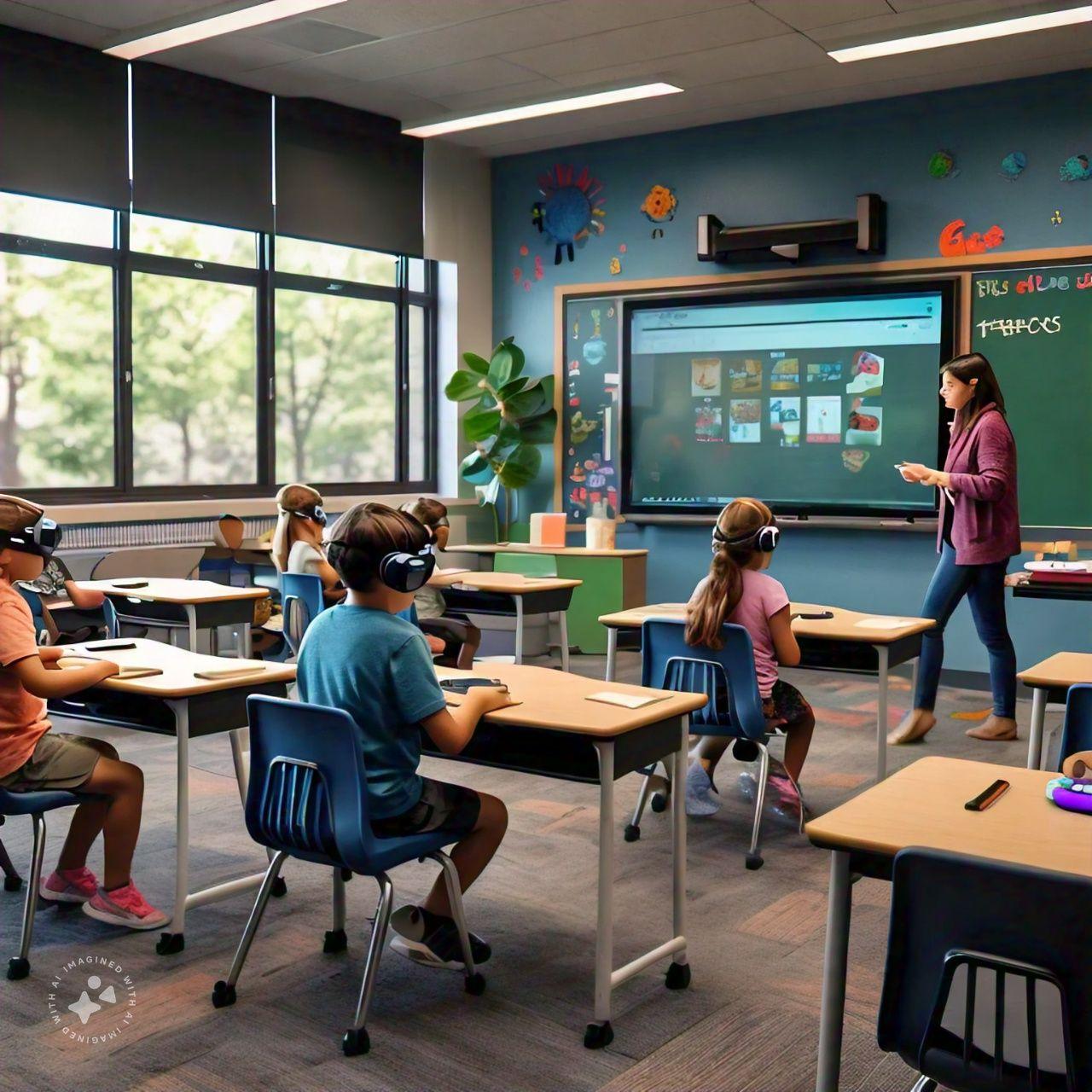THE FUTURE OF LEARNING: TRENDS AND INNOVATIONS IN EDUCATION

The education landscape is evolving rapidly, driven by technological advancements, shifting learner needs, and innovative teaching methods. To prepare for the future of learning, it's essential to understand the trends and innovations transforming education
ED TECH TRENDS
These technological advancements enhance teaching, learning, and assessment.
1. ARTIFICIAL INTELLIGENCE (AI) INTEGRATION: AI-powered tools automate grading, provide personalized feedback, and optimize learning pathways.
2. VIRTUAL AND AUGMENTED REALITY (VR/AR) LEARNING: Immersive experiences simulate real-world environments, enhancing engagement and retention.
3. PERSONALIZED LEARNING PLATFORMS: Adaptive software tailors instruction to individual needs, abilities, and learning styles.
4. GAMIFICATION AND INTERACTIVE LEARNING: Game design elements encourage engagement, friendly competition, and interactive exploration.
5. MOBILE LEARNING AND ACCESSIBILITY: Mobile devices extend learning beyond classrooms, enabling flexibility and accessibility.
6. LEARNING ANALYTICS AND DATA-DRIVEN INSIGHTS: Data analysis informs instruction, identifies knowledge gaps, and optimizes educational strategies.
7. CLOUD-BASED LEARNING MANAGEMENT SYSTEMS: Centralized platforms manage curriculum, assessments, and communication.
INNOVATIVE LEARNING MODELS
These approaches redefine traditional teaching methods.
1. COMPETENCY-BASED EDUCATION: Students progress by demonstrating mastery of specific skills and knowledge.
2. PROJECT-BASED LEARNING: Real-world projects foster critical thinking, collaboration, and problem-solving.
3. FLIPPED CLASSROOM APPROACH: Students learn basics at home, reserving class time for interactive application.
4. MICROLEARNING AND BITE-SIZED CONTENT: Concise lessons accommodate diverse attention spans and learning styles.
5. SOCIAL LEARNING AND COMMUNITY ENGAGEMENT: Collaborative environments encourage peer interaction, discussion, and networking.
6. SELF-DIRECTED LEARNING AND AUTONOMY: Learners take ownership of their education, setting goals and pacing themselves.
7. INTERDISCIPLINARY AND STEAM EDUCATION: Integrated curricula combine subjects (Science, Technology, Engineering, Arts, and Math) for holistic understanding.
TEACHING STRATEGIES FOR THE FUTURE
Effective instructors adapt to emerging needs.
1. ADAPTIVE TEACHING METHODS: Teachers adjust instruction to meet diverse learner needs.
2. REAL-WORLD APPLICATION AND PROBLEM-SOLVING: Relevant examples connect theory to practical scenarios.
3. COLLABORATIVE TEACHING AND MENTORSHIP: Instructors facilitate peer learning and guidance.
4. EMOTIONAL INTELLIGENCE AND WELL-BEING INTEGRATION: Educators address students' social-emotional needs.
5. CULTURAL COMPETENCE AND DIVERSITY AWARENESS: Teachers promote inclusive environments.
6. TECHNOLOGY-ENHANCED INSTRUCTION: Educators leverage technology to enhance engagement and understanding.
7. CONTINUOUS PROFESSIONAL DEVELOPMENT: Teachers update skills to stay current with best practices.
BENEFITS OF FUTURE-READY EDUCATION
These outcomes characterize effective future-focused education.
1. ENHANCED STUDENT ENGAGEMENT: Learners participate actively in meaningful experiences.
2. IMPROVED ACADEMIC OUTCOMES: Students demonstrate better understanding and retention.
3. INCREASED ACCESSIBILITY AND EQUITY: Education reaches diverse populations.
4. BETTER PREPARATION FOR THE WORKFORCE: Graduates possess relevant skills.
1. LIFELONG LEARNING AND SKILL DEVELOPMENT: Learners cultivate adaptability.
2. ENHANCED TEACHER SATISFACTION: Educators find fulfillment in effective teaching.
3. MORE EFFICIENT EDUCATION SYSTEMS: Resources optimize learning.
CHALLENGES AND CONSIDERATIONS
Addressing these concerns ensures successful implementation.
1. DIGITAL DIVIDE AND EQUITY: Access disparities hinder progress.
2. DATA PRIVACY AND SECURITY: Safeguarding learner information.
3. TEACHER TRAINING AND SUPPORT: Professional development.
4. CURRICULUM RELEVANCE AND UPDATES: Keeping pace with changing needs.
5. INFRASTRUCTURE AND RESOURCE ALLOCATION: EfCALL TO ACTION:
Educators, policymakers, and stakeholders must work together to harness the potential of educational innovations. By embracing the future of learning, we can create a more inclusive, effective, and transformative education system.
SOURCES:
- UNESCO Institute for Information Technologies in Education
- OECD Centre for Educational Research and Innovation
- National Education Association (NEA)
- Education Week
- EdSurge
fective distribution.
6. BALANCING TECHNOLOGY AND HUMAN INTERACTION: Preserving personal connection.
7. ADDRESSING LEARNING GAPS AND INEQUALITY: Targeted support.

- Art and Design
- Automotive
- Beauty and Health
- Books
- Business
- Careers
- Community Building
- Corporate
- Creative writing
- DIY and Crafts
- Onderwijs
- Environmental Issues
- Fashion
- Finance
- Fitness
- Food
- Gaming
- Gardening
- Green Living
- Health and Wellness
- Home Decor
- Lifestyle
- Homepagina
- Music
- News
- Non-profit
- Parenting
- Personal Development
- Pet and animal
- Photography
- Podcasting
- Politics
- Product Reviews
- Real Estate
- Religion
- Science and Technology
- Social and culture
- Software Reviews
- Sports
- Sustainability
- Technology Reviews
- Travel and Events
- Videography
- The DOT2025 Journal


